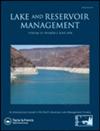内陆湖游船尾流的相对重要性
IF 0.8
4区 环境科学与生态学
Q4 LIMNOLOGY
引用次数: 0
摘要
[摘要]张建军,张建军,张建军,等。内陆湖游船尾迹的相对重要性。湖泊保护区管理。37:22 27 - 234。休闲船产生的尾流有可能侵蚀海岸线、破坏基础设施或破坏水生生态系统。因此,船舶尾迹日益成为沿海管理的重要焦点,特别是在脆弱的海岸线上。这种简短的交流量化了加拿大安大略省北部内陆平房湖岸线上休闲船尾流能量的相对重要性。在对湖面上本地产生的风浪进行最长的一次采集结束时,对休闲船尾迹的测量占总波浪能量的60%。基于这一结果,休闲尾流能量可能是主要航行线附近湖泊部分波浪活动的主要来源,但与风浪能量的主要方向不一致。休闲船的尾迹可能是其他内陆湖泊波浪能量的重要来源。本文章由计算机程序翻译,如有差异,请以英文原文为准。
Relative importance of recreational boat wakes on an inland lake
Abstract Houser C, Smith A, Lilly J. 2021. Relative importance of recreational boat wakes on an inland lake. Lake Reserv Manage. 37:227–234. Wakes generated by recreational boats have the potential to erode the shoreline, damage infrastructure, or disrupt aquatic ecosystems. Therefore, boat wakes are an increasingly important focus of coastal management, particularly along vulnerable shorelines. This short communication quantifies the relative importance of recreational boat wake energy along the shoreline of an inland cottage lake in Northern Ontario, Canada. Measurements of recreational boat wakes at the end of one of the longest fetches for locally generated wind waves on the lake account for >61% of total wave energy. Based on this result, recreational wake energy likely is the primary source of wave activity along sections of the lake adjacent to the primary sailing lines but not aligned to the primary directions of wind wave energy. Recreational boat wakes may be a significant source of wave energy on other inland lakes.
求助全文
通过发布文献求助,成功后即可免费获取论文全文。
去求助
来源期刊

Lake and Reservoir Management
环境科学-海洋与淡水生物学
自引率
6.70%
发文量
22
期刊介绍:
Lake and Reservoir Management (LRM) publishes original, previously unpublished studies relevant to lake and reservoir management. Papers address the management of lakes and reservoirs, their watersheds and tributaries, along with the limnology and ecology needed for sound management of these systems. Case studies that advance the science of lake management or confirm important management concepts are appropriate as long as there is clearly described management significance. Papers on economic, social, regulatory and policy aspects of lake management are also welcome with appropriate supporting data and management implications. Literature syntheses and papers developing a conceptual foundation of lake and watershed ecology will be considered for publication, but there needs to be clear emphasis on management implications. Modeling papers will be considered where the model is properly verified but it is also highly preferable that management based on the model has been taken and results have been documented. Application of known models to yet another system without a clear advance in resultant management are unlikely to be accepted. Shorter notes that convey important early results of long-term studies or provide data relating to causative agents or management approaches that warrant further study are acceptable even if the story is not yet complete. All submissions are subject to peer review to assure relevance and reliability for management application.
 求助内容:
求助内容: 应助结果提醒方式:
应助结果提醒方式:


